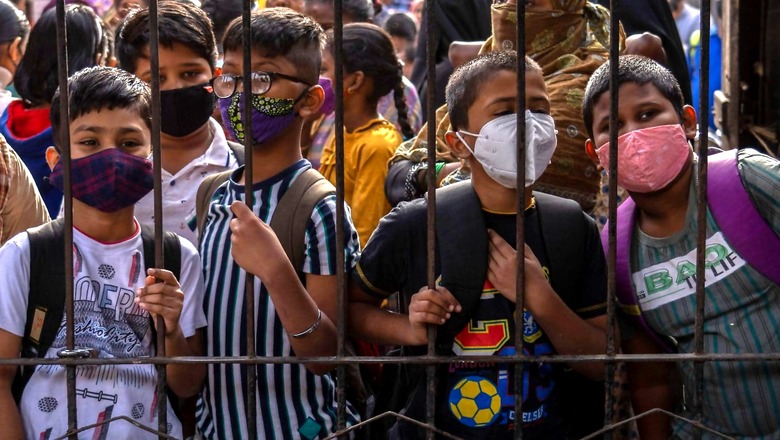
views
As the New Year approaches the end of January, a weary world wonders whether there will be an end to the Covid-19 pandemic this year.
The misconceived optimism that the virus will be vanquished by vaccines in 2021 vanished amidst the assault of variants. Will the armour of immunity that millions of natural infections and billions of vaccine doses have built up over the past 14 months protect against severe disease and death, even if periodic spikes of infections and mild illness are accepted as part of the peace accord that we negotiate with the virus?
As the wry remark “prediction is very difficult especially about the future” (variably attributed to writer Mark Twain, scientist Niels Bohr or malapropism prone sportsman Yogi Berra) indicates, it is risky to predict the further course of Covid-19.
The virus has surprised us all with its adaptive ability to evade vaccines by springing new variants and its agility in picking up speed of transmission as it moves to a new leg in that relay race. Further, we recognise that the levels of immunity and susceptibility vary across the world and the experience of the pandemic may differ among countries over the course of the year, even if there is no new variant of concern.
As far as India is concerned, we have some reasons to feel cautiously optimistic and some others to watch the future with concern. The optimism springs from the fact that many who weathered the Delta storm and the large number who have been fully vaccinated are likely to experience relatively mild, non-life threatening illness, if infected.
Over 90% of eligible persons have reportedly received at least one dose. If the vaccination programme swiftly completes double dose vaccination in all eligible persons over 15 years of age, and administers boosters to all who are vulnerable to severe disease, the virus will scratch or sting but not bite when it infects.
Children below 15 years of age have a low risk of experiencing severe illness, even if infected. If every person wears proper mask outdoors, the risk of transmission, too, will be greatly reduced.
‘Decoupling’ of infected ‘cases’, from hospitalisation or death from severe illness, is being reported from different cities of India and many other countries which are experiencing the Omicron wave.
The US, with a sizeable fraction of its population stubbornly resisting vaccination and masks, is experiencing both a flood of infections and severe cases leading to hospitalisation or death. India, with very limited opposition to vaccines and a partial if not full adherence to masks, is among the better placed countries at present.
If past exposure to other coronaviruses also provides cross-immunity through memory T cells, as suggested in a recent study, our children may be protected by their past upper respiratory infections.
In contrast to this optimistic scenario, there are potential threats that we must be wary of. A new variant may arise within the country, in unvaccinated persons who experience severe and prolonged disease. It may arise in other parts of the world and enter India, surreptitiously sneaking through our entry point checks.
The variant may arise through antigenic drift, with mutations in the genetic structure of the Covid virus itself or through ‘antigenic shift’ wherein the virus swaps some of the genetic material with another type of virus to create a new form.
In either case, the result can be more virulent or even less virulent. What makes evolutionary sense for the virus is to find, sustain and spread a form which can infect more easily by evading pre-existing immunity conferred by vaccines or earlier infections.
Our best hope is that it will reduce its virulence in that process, in order to retain a host population which it can infect and periodically reinfect to continue the presence of its own progeny in the world.
Another concern is related to the capacity of the virus to infect other animals, as already demonstrated. In this case, the concern is not only about an unvaccinated reservoir host but also about the potential for new and more dangerous variants emerging from antigenic shifts occurring through viral admixture in infected animals.
Added to these biological concerns are the behavioural concerns related to flouted safety regulations by humans. Despite pleas to avoid crowded events, especially in ill-ventilated indoor places, people are continuing to participate in closely packed political, religious and social gatherings.
If persons with low levels of immunity get infected as a result, the virus will get an opportunity for a prolonged stay in them where it can mutate to new forms during its many cycles of replication. If those forms are highly capable of immune evasion, many others too will be afflicted.
Weighing the balance of probabilities, between the favourable and unfavourable factors that may shape the future, a cautiously optimistic expectation is that the Covid pandemic will not unleash a ferocious flood of severe disease even if showers of mild cases will occur periodically.
Counting the numbers of persons infected does not give us accurate estimates, as many will be asymptomatic or mildly symptomatic and not get tested. Nor will the detection of mild cases influence treatment strategies, provided every one with fever or symptoms of upper respiratory infection follows advice to stay home, be masked and report to hospitals if symptoms become severe.
We do need to improve our primary care services, to provide supportive and supervised home care to such persons. We also need to carefully monitor the numbers of persons seeking hospital care with serious illness. If these are few, and remain so till the end of 2022, we can gain confidence that the virus is entering a state of co-existence where it will stay amidst us while posing less danger than in the first two years of its joust with the human race.
Accepting such a truce may be humbling for humans who take great pride in their technological prowess but the fact that microbes have honed their evolutionary skills and survived far longer than our species has existed should give us a much needed ecological perspective.
While hoping for such an outcome, we must improve our capacity for genomic surveillance to detect and evaluate new variants. Our health systems must benefit from the lessons of the past waves by strengthening the capacity for providing assured, timely and competent care at all levels, but especially so in primary care settings.
Even if Covid infections result in mild illness, we should have long-term follow up to evaluate the incidence and severity of long Covid complications. We must explore the avenues for developing new vaccines which are capable of overcoming variants. The protective effect of a universal coronavirus vaccine, now under trials, must be examined carefully for possible future use.
While we do this, society must resume its essential functions. Schools and colleges must reopen. Economic activities must scale up. Essential travel can be undertaken. Masks must be worn for some months more, while we study the trends of Covid illness in India and elsewhere in the world.
I draw confidence from a tweet from Singapore that came to my attention as I was writing this piece. Gerry Doyle writes that, in the last 28 days, the case numbers are going up in the “massively vaccinated” country but 99.7% of them were asymptomatic or mild. They did not require oxygen or ICU care and did not have a fatal outcome.
If the world can demonstrate global solidarity and good sense, eschewing vaccine nationalism and observing Covid appropriate behaviours, other countries too can reach that state in 2022. India is on track to reach there, if we bridge the vaccination gap while ensuring that masks are universally worn in public.
Will central and state governments please provide good quality masks to all low income families, free of cost, so that we can achieve mask equity as well as vaccine equity?
Prof K Srinath Reddy, a cardiologist and epidemiologist, is President, Public Health Foundation of India (PHFI). The views expressed in this article are those of the author and do not represent the stand of this publication.
Read all the Latest Opinions here




















Comments
0 comment